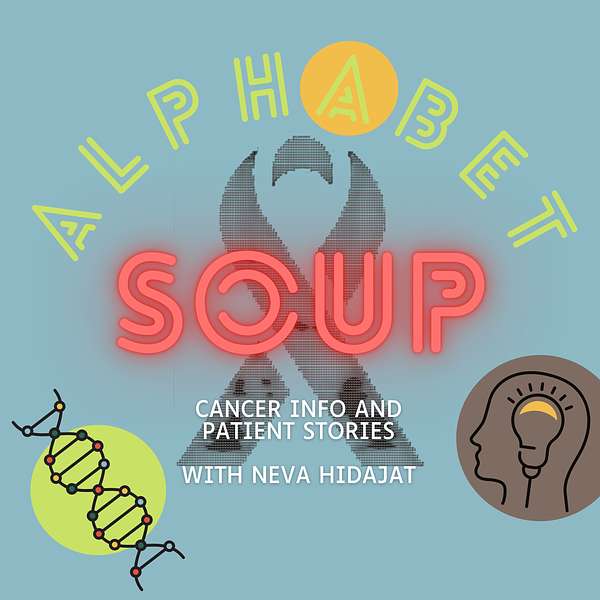
Alphabet Soup: A Mental Health & Medicine Podcast
Alphabet Soup: A Mental Health & Medicine Podcast
Ep. 36 Pursuing Happiness in the Cancer Patient
Everyone deserves to be happy. Research has shown that happiness in cancer patients can improve their outlook on treatment and life. How can we pursue happiness? A Portuguese study gives insight into two concepts of happiness in the cancer patient: self-perception and health literacy (knowledge). You'll find that these concepts are applicable to anyone. To anyone looking to find happiness, press play!
Sources:
https://pubmed.ncbi.nlm.nih.gov/24089635/
https://www.google.com/search?q=bedside+manners+abraham+verghese&rlz=1C1CHBF_enUS881US881&oq=bedside+manners+abraham+verghese&aqs=chrome..69i57j33i160j33i299.9036j0j9&sourceid=chrome&ie=UTF-8
Welcome to Alphabet Soup! This is your host Neva Hidajat. While this episode is focused on the cancer patient, I believe there is something to gain that applies to anyone who is looking to increase their happiness and in turn, their quality of life. So, if this sounds like you, keep listening!
Over the past few decades, there have been many improvements in technology that have advanced cancer treatment. However, these advancements have created the concern about whether longer life expectancy, always corresponds with better quality of life? Interest in assessing cancer patients’ quality of life, which has deep roots in their level of happiness, is continuing to gain greater significance. In 2013, a study was developed by Portuguese medical students that aimed to understand how information about their condition and their own beliefs affect the vision of the future and happiness of patients undergoing chemotherapy. The study confirmed the existing idea that self-perception correlated to happiness and introduced a new idea that health literacy also promotes wellbeing and happiness.
In cancer patients, levels of happiness have a lot to do with the patient’s self-perception of their wellbeing. To improve happiness, medical professionals who wish to provide better emotional care for their patients are encouraged to investigate strategies to help patient’s have moments of wellbeing and happiness. This can help them navigate through their difficult circumstance. A resource that analyzes the doctor-patient relationship is Dr. Abraham Verghese’s book Bedside Manners which details the importance of making patient’s feel truly cared for. Through Verghese’s travels to teaching hospitals as a visiting professor, he said he has, “the distinct feeling that the patient in America is becoming invisible.” This further emphasizes the importance of holistic care, which demonstrates not just medical treatment for illness but care for the mental and social factors patients are dealing with.
Another concept that affects happiness is health literacy, which is a person’s ability to obtain, process, and understand information on health and make decisions for their health based on what they know. Research suggests that when patient’s have higher health literacy, they feel more in control of their situation as it helps them to make informed choices about their treatment. The NCBI shares that low literacy, particularly in cancer patients, can lead to decreases in patient welfare, increases in anxiety and depression, false conceptions about their condition, and, as a result, lower adherence to therapeutic efforts and less satisfaction with their care. So, lower understanding demotivates patients outlook on treatment, which may even reflect their greater outlook on life. Ensuring that patients and family are well-informed is a critically important responsibility that could improve a patient’s outlook on life. In a similar sense, people who are knowledgeable about fitness or even mental health are more motivated to put effort into working out or self-reflection because they have a greater sense of control and knowledge on how to accomplish their goals.
In essence, optimism can help a patient restore the meaning of life and face the challenges that their cancer journey presents them with. Self-awareness and knowledge can help the patient to continue having faith in their medical treatment and help them face their challenges with less fear.
For today’s bit, I’d like to turn it over to the listener. Take a moment to think about what makes you happy? One of the weird things that give me joy is having a nice smelling room. There’s just something about my essential oil diffuser spreading an aromatic scent through the air puts a smile on my face. If it’s hard to think of something that makes you happy, it may have something to do with high levels of consumption, not of food, but of media content. Nowadays a lot of us get our dopamine from watching videos or playing games, and other forms of consumption. If this sounds like you, maybe make a note to try pursuing creating your own happiness instead. A few ideas could be learning how to cook or make music, teaching your dog how to sit, it really could be anything, as long as it comes from you, not from an outside source. Try it out! And let me know how it goes by sending me a dm on Instagram! @alphabetsoup.podcast. I’d love to hear about what makes you happy.
Lastly, everything I’ve discussed in this episode pertaining to happiness in the cancer patient can also be taken as knowledge to improve anyone’s happiness. Finding ways to take control of your own happiness and knowledge can be a really powerful thing to live for.
If you enjoyed today’s episode, please feel free to leave a review and share it with someone who makes you happy! Thanks for listening and I’ll see you in the next episode.